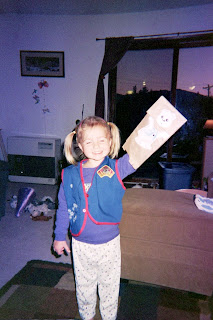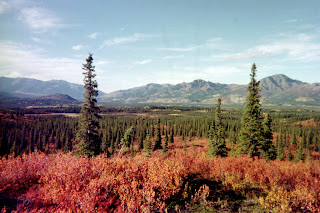It has been an amazingly convoluted and action-packed few months up here in the Great Land. We had our trip back east including a jaunt around Lake Michigan. We started homeschool. Amelia started preschool. I'm in the choir at church. Greg is traveling quite a bit with work. Mix in all the other miscellaneous stuff like the fact that the house we are renting is for sale (lots of strangers traipsing through our chaos), some hunting and fishing trips for mostly Greg, plus illnesses and injuries, and you've got yourself a better picture of what's going on up here.... yes, you're right - it's the same ol', same ol'. A lot of it.
All these pictures were taken with a disposable camera, thus the surreal 110 film quality. Classic, huh? Very retro!
Here's the big KING crab that Greg and the girls caught in mid-October. (editor's note: Greg informed me after I published, that this crustacean is indeed an Alaskan King Crab. Yowza!)
What happy Alaskan girls! They were so excited about that huge crab!
Amelia learned how to ride her bike this summer; she is fast and fearless!
And a few pictures from Greg's moose hunt in September.
A new glitch that we hadn't anticipated has recently tossed us like a rogue wave. We have sold our microwave, are no longer using the dishwasher, and have not only gotten rid of most of our plastics and other synthetics (like polyester and nylon), but also are trying not to purchase or acquire any new ones. It is impossible, I'm here to tell you.
Need a hole in the head? Need a reason to find fault with every consumable item currently manufactured? If not, don't read this book: Slow Death by Rubber Duck.
Look at this little guy:
Isn't he just adorable? He's also toxic and likely has known chemical properties that disrupt hormone development in children. Nice!Seriously, after innocently picking this up off our "new book" shelf in the local library, I can't UNknow what I now know. I have tried for three weeks now to purchase groceries without also purchasing plastics. NOT YET POSSIBLE, at least in Alaska. We have no bread stores where I can purchase fresh loaves in paper sacks. All our cereal, even the bulk stuff is in plastic bags. I've taken to making my own noodles and bread. And crackers. And just how am I supposed to buy meats? The teen/young-adult goofballs at our deli department don't even know what "butcher paper" is. Help! Don't get me started on my Teflon, Ziplocs, and yogurt container issues.
Aside from being exceptionally dangerous to both the immediate and the long-term (like in, "up to three generations after exposure") health of humans, plastics will be with us forever: once plastics are created, they can't be UNcreated. They will NEVER go away. Yes, they can be recycled into lovely hats and sweaters and fashionable eco-fleece products, but what happens when those garments are worn out or become out-of-style? Yes, they can also be reused, given to charity, or consigned to the less fashion-conscious among us (me, thank you very much), but what of them after they serve their useful life?
Greg has this great fleece jacket that he's had longer than he's had me. It's blue and in places, it is worn through so thin that I can see his tee shirt beneath it. Not even a (really tall) homeless guy is going to want it, but guess what? Earth can never be truly rid of it. It will not biodegrade. The only close way to make it be gone is to burn it, but did you know that fleece is a PETROLEUM PRODUCT? Yes, it is made from a combo of two different petroleum derivatives, including antifreeze. So burning would surely send something toxic into the very air we like to breathe.
The next time you see an environmentalist in her fancy Polartec (c) coat, spouting off about how we need to save the trees and birds and animals, let her know she is killing our planet, wouldja? Please, do not get me wrong (or send me hate mail) about this - living in Alaska, being the outdoorsy folks we are, we have basically survived in fleece for 10+ years. I think I knew that fleece was just soft, fluffy plastic all along, but I never realized how invasive and pervasive and dangerous the compounds and polymers in plastic are and how easily they are ingested and absorbed into the human body. It's quite scary, really. (Here's a mind-blowing fact: right now, in the US, the burden of proof regarding the toxicity or relative safety of a chemical, plastic, product, medicine, food, etc is on the consumer... the consumer must prove that something is dangerous before the FDA or the company who manufactures it will pull it from production. CRAZY! With what we know of the hazards of plastics and other toxins, shouldn't whomever wants to utilize it/market it first prove to us that it is safe? I mean, am I way off base here? Did we learn nothing from Agent Orange? Alar? Lead-based paints? Why can we still be subjected to all manner of lethal, insiduous products in such a sneaky, profit-driven way?)
In fact, most plastics do eventually break down. "Fantastic! Finally some good news!", you may think. Sadly, the breaking down just serves to make teeny, tiny sloughed-off pieces that look very similar to krill and plankton. (Take that, ocean creatures!) And to think, only about 25 years ago, plastics were still only rarely used for food packaging, let alone for clothing.
Remember when milk came in glass bottles? Me neither. But remember when Coke did? How about mayonnaise or ketchup? Some of you may know how much my husband loves ketchup. Actually "loves" might be too weak a word. I think "needs" would better describe his relationship with that tangy sauce. You may not be aware of this, but it is extremely difficult to find affordable ketchup in a glass bottle. In Alaska.
I mentioned already that polyester is not a naturally occurring fiber, right? OK, since in AK, cotton is NOT our friend, we are now aiming for all-natural fibers such as wool, linen, silk, hemp, ramie, jute, and bamboo. However, depending on how these fibers are processed, they can be just as harmful to ecosystems as plastics. What is a girl to do?
Well, for starters, here's a great list of how to reduce your dependance on plastics, if you're interested:
Nothing will change if we do not hit the companies in their collective pocketbooks. If we stop purchasing their products due to the unethical packing, maybe they will revert to plastic-free papers, cardboard, and glass.
We can tackle the garment issue in another post. For now, here's a promising brand ...http://www.ibex.com/
Are ya with me?
Oh, wait, one more thing - an incredible irony: What are store-bought reusable grocery bags made of? Yes, polyester! Ha! Gotta laugh at that!
Glad to be back. Hope I can keep this to a regular, once-a-week post, at least. Let me know your thoughts on any of this, will you?








